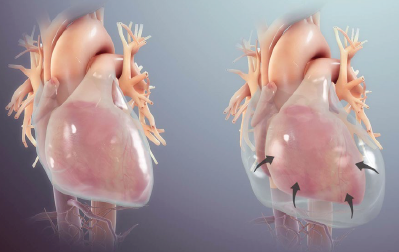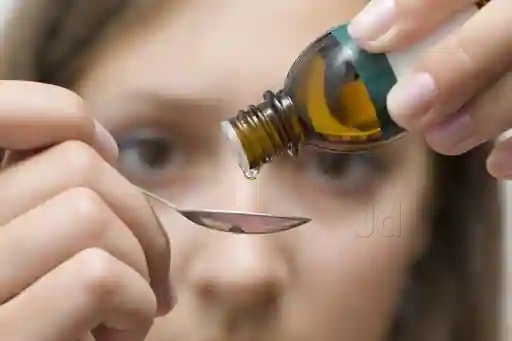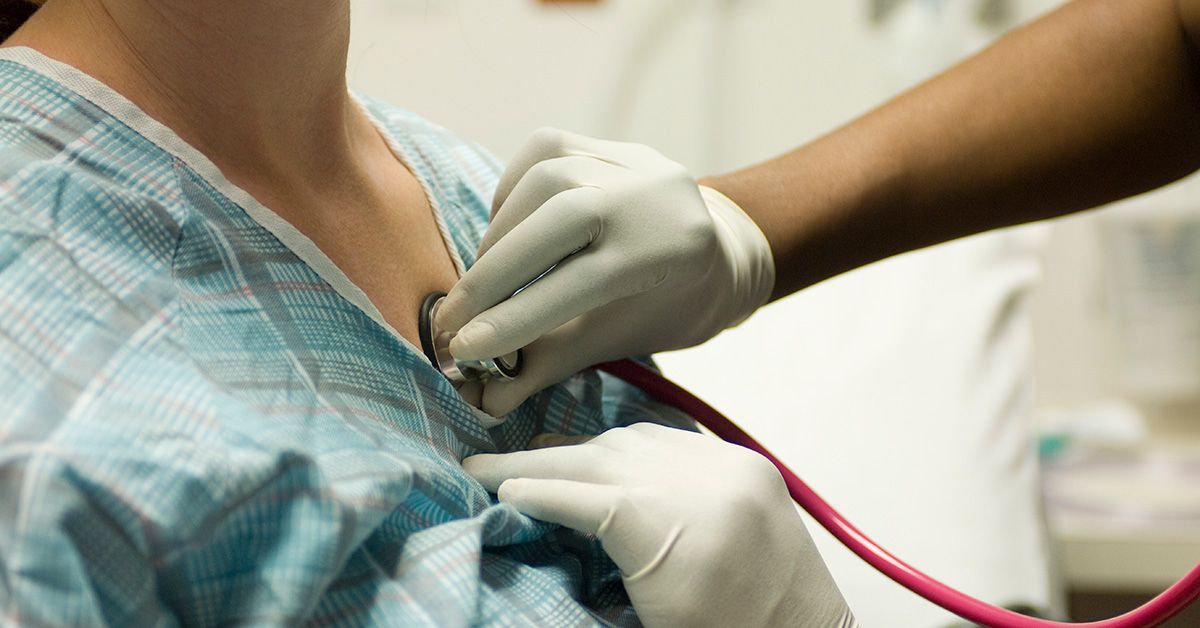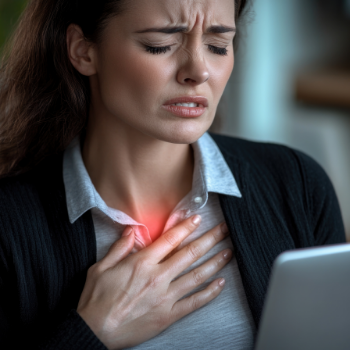Pericardial effusion is a collection of excess fluid in our pericardium (the sac around our heart). When it happens quickly or involves a large amount of fluid, the extra fluid can take up too much space in our pericardium. This compresses our heart and interferes with how it should work.
Pericardial effusion can happen for many reasons, like infections, injuries etc. If the buildup is severe or happens quickly, it can compress our heart and can cause life-threatening emergency.
When a pericardial effusion happens slowly, our pericardium (the sac around your heart) has time to stretch and make room for the extra fluid. When it happens quickly, our pericardium doesn’t have time to stretch. The fluid buildup puts more and more pressure on our heart. This leaves your heart’s chambers without room to expand and fill up. Because of this, heart pumps less blood, depriving our organs of blood flow just like a balloon inside of a plastic bottle (In this example, your heart is the balloon, and the bottle is the pericardium, when the bottle is empty, there’s more space for the balloon to inflate, if you add water to the bottle, there’s less space and you can’t blow up the balloon as much. If you keep filling the bottle, eventually, you can’t blow up the balloon at all).
Complications
What are the complications of this condition?
A pericardial effusion can lead to cardiac tamponade. Between the inner wall of the pericardium and our heart is a thin layer of fluid. This cushions and protects our heart from outside forces (much like bubble wrap around a fragile item inside a shipping box).
Usually, our pericardium has just enough fluid to cushion the heart, but not so much fluid that it keeps the heart from expanding and filling up with blood. Cardiac tamponade happens when our heart has no room to expand and fill with blood. Without quick treatment, it can make the heart stop.
Cardiac tamponade is a complication of pericardial effusion, but not the only one. As our heart pumps less and less blood, it speeds up to try to make up for its limited pumping ability. Over time, our heart can’t keep up, and one can go into cardiogenic shock which can be fatal.
Symptoms
Patient may not have any pericardial effusion symptoms with a mild case. Symptoms are more likely when an effusion happens quickly, involves a large amount of fluid or causes cardiac tamponade. The main symptoms of pericardial effusions and cardiac tamponade include:
- Dyspnea.
- Chest pressure or pain.
- Fast heartbeat or heart palpitations.
- Lightheadedness or dizziness.
- Fainting (syncope).
- Fatigue.
- Anxiety, confusion or other behavior changes (because of low blood flow to the brain).
- Cyanosis (blue or gray tinge to the lips or under the fingernails because low blood oxygen levels).
If a pericardial effusion is large enough, it can press on surrounding tissues or nerves. That can cause symptoms like:
- Trouble swallowing (dysphagia).
- Hiccups.
- Coughing or hoarseness.
What causes pericardial effusion?
Unknown reason is the most common cause of a pericardial effusion – Tuberculosis is the most common cause but it has many different causes. It often happens along with (or because of) inflammation of the pericardium (pericarditis).
Other possible causes of pericardial effusion include:
- Infections. Pericardial effusion often happens because of viral or bacterial infections, including human immunodeficiency virus (HIV) and tuberculosis. It can also happen because of fungal infections or parasites. Pericardial effusion itself isn’t contagious.
- Cancer. Tumors in the heart or that spread from elsewhere in the body can damage pericardium.
- Immune system conditions or inflammatory disorders. These include lupus, rheumatoid arthritis or Sjögren’s syndrome.
- Hormonal disorders or problems. An example of this is hypothyroidism.
- Trauma. Injuries to the chest, including blunt impacts (like car crashes etc) and punctures from knives or bullets, can cause pericardial effusion.
- Heart or circulatory problems. These include heart attacks, heart valve disease or aortic dissection (layers on the inside of aorta separate or tear).
- Medical causes. Pericardial effusion can happen after heart surgery, radiation therapy for cancer and as side effects of allopathic medicines.

- Other. Pericardial effusion can also happen with heart failure, chronic kidney disease, kidney failure or liver cirrhosis.
Diagnosis and Tests
How is pericardial effusion diagnosed?
If patient has symptoms, a doctor will diagnose pericardial effusion based on the symptom’s patient describe his/her medical history, medical testing and a physical exam.
If patient don’t have symptoms, the most likely way a doctor will diagnose pericardial effusion is if they happen to see it on images (X-ray, US etc) ordered for another reason.
Tests used to diagnose this condition
If a doctor suspects a pericardial effusion, he/she should order several other tests for example:
Order an electrocardiogram (EKG) to check patient’s heart’s electrical activity. Order imaging tests like:
- Echocardiogram.
- Chest X-ray.
- Computed tomography (CT) scan of chest.
- MRI of the heart.
I you (doctor) diagnose pericardial effusion, order the following lab tests to find the cause of patient’s condition. These tests include:
- Complete blood count (CBC).
- Troponin.
- Homocysteine blood test.
- B-type natriuretic peptide.
- Thyroid-stimulating hormone.
- Immune system tests (to look for immune system disorders or inflammatory conditions).
In some cases, your provider may be able to test the fluid they remove from your pericardium. These results can sometimes help them find the cause of the effusion.
A unique blood test for pericardial effusion, watch on YouTube:
Allopathic Management and Treatment for Pericardial Effusion
What is the treatment for pericardial effusion?
The pericardial effusion treatment a patient gets depends on how severe the patient’s condition is and what caused it.
If patient has a small or medium-sized pericardial effusion that’s shrinking or not changing size, and patient don’t have symptoms, according to allopathic doctors, patient may not need any treatment. In these cases, an allopathic doctor will probably want to monitor the effusion size and only treat it if patient develops symptoms or if there are other signs that it might be a problem. However, Homeopaths pretends to start treatment as soon as possible (in early stages).
If patient has an effusion that’s growing more quickly, that’s causing symptoms or that’s happening because of more serious conditions (especially trauma or cancer), patient will probably need treatment sooner rather than later.
Large effusions
When a pericardial effusion is large or causes cardiac tamponade, it becomes an emergency that needs immediate treatment. Unlike smaller amounts, the pericardial fluid won’t go away unless you remove it.
Potential treatments include:
Needle aspiration (pericardiocentesis):
Surgery:
In allopathic practice, in some cases, surgery is the best way to remove the extra fluid inside the pericardium. It may an emergency surgery or a scheduled procedure (when an effusion causes symptoms but is slow-growing and not dangerous). A common surgical procedure for this is video–assisted thoracic surgery (VATS). This creates a pericardial “window” to allow draining fluid to spill into the larger pleural cavity, so it doesn’t fill up the pericardial space.
In cases where an effusion isn’t dangerous and doesn’t need any of the above allopathic treatments, an allopathic doctor can often manage it with allopathic medications or other types of treatments for example Homeopathic. The treatments depend on the underlying cause. These include, but aren’t limited to, the following:
-
Antibiotics for infections like tuberculosis.
-
Anti-inflammatory drugs to help reduce inflammation and swelling.
-
Chemotherapy and radiation therapy for people whose pericardial effusion happens because of cancer.
-
Diuretics and other medications for people with heart failure as the cause of their pericardial effusion.
Homeopathic Management and Treatment for Pericardial Effusion
Pericardial effusion in any stage is considering dangerous and Homeopathic doctors will treat it as soon as possible with only medication, without surgery; especially when a pericardial effusion is large or causes cardiac tamponade, it becomes an emergency that needs immediate treatment. Just like smaller amounts, the huge amount of pericardial fluid will go away in few hours or days. 
Here are few medicines for pericardial effusion:
Apis Mellifica
Acts on cellular tissue, removing edema, swelling, inflammation etc. Feels as if he could not draw another breath. Suffocation; short, dry cough, suprasternal. Hydrothorax.
Belladona
Active congestions, heat/burning, redness, throbbing. Flushed face, glaring eyes, throbbing carotids, excited mental state, hyperesthesia of all senses, delirium, restless sleep, convulsive movements. Hypertrophy of mucous membrane. Tickling, short, dry cough. Barking cough, whooping cough, with pain, with expectoration of blood, stitches in chest. Violent palpitation, reverberating in head, with labored breathing. Palpitation from least exertion. Throbbing all through body. Dichroism. Cardiomegaly. Rapid but weakened pulse.
Aconite Nepalus
Attacks of paralysis in the epiglottis, with a tendency to choking. A constant desire to cough, produced by an irritation or a tickling in the larynx. Inflammation of larynx and bronchia. Angina membrane, with dry cough and quick breathing. Short breathing, breathing painful, anxious, and attended with groans, rapid and superficial, or full, noisy. Breath hot, fetid. Constriction and anxious oppression of the chest, with difficulty of breathing. Palpitation of the heart, with great anxiety and temperature. In heart region, sensation of compression and blows.
Inflammation of the heart. Chronic heart diseases, with continuous pressure in chest, oppressed breathing and ascending steps, stitches in the region of the heart, congestions to the head. Attacks of fainting and tingling in the fingers. Pulse full, strong, hard; slow, feeble; threadlike with anxiety; quick, hard, small.
Morphinum
Alternation of tachycardia and bradycardia. Cardiac muscular tissue is intact, even if severely exhausted. Pulse small, weak, dicrotic. Faint and struggling for breath diaphragmatic paralysis; hiccough; dyspnea, paroxysmal. Cheyne-Stokes respiration. Chest tight. Pain in middle of sternum. Dry, hard, teasing, exhausting cough, worse at night. Strangling cough, with viscid mucus sputum; thin, scanty, but sounds loose and abundant.
Sillicia Tera
Silica can stimulate the organism to re-absorb unwanted tissue. Abscesses. Stitches in chest through to back. Violent cough.
Kali Carbonicum
Soft pulse, coldness, general depression, and very characteristic stitches and cutting pains in chest. Throbbing pains. Tendency to dropsy. Tubercular diathesis. Hydrothorax. Leaning forward relieves chest symptoms. Expectoration must be swallowed; cheesy taste; copious, offensive, lump. Coldness of chest. Wheezing. Cough with relaxed uvula. Tendency to tuberculosis; constant cold taking; better in warm climate. Sensation as if heart were suspended. Palpitation and burning in heart region. Weak, rapid pulse; intermits. Threatened heart failure.
Kali Iodatum
It acts prominently on fibrous and connective tissues. Infiltration. Edema. Glandular swellings. Purpura and hemorrhagic diathesis. Violent cough. Pulmonary oedema. Laryngeal edema. Awakes choking. Expectoration like soapsuds, greenish. Pneumonia, when hepatization commences. Pneumococci meningitis. Stitching pains through lungs to back. Asthma. Dyspnea on ascending, with pain in heart. Hydrothorax. Pleuritic effusion. Cold travels downward to chest.
Arsenicum Album
A profoundly acting medicine on every organ and tissue. Debility, exhaustion, restlessness. Great exhaustion after the slightest exertion. Burning pains. Unable to lie down; fears suffocation. Air-passages constricted. Burning in chest. Cough worse lying on back. Expectoration scanty, frothy. Darting pain through upper third of right lung. Wheezing respiration. Hemoptysis with pain between shoulders; burning heat all over. Cough dry, as from Sulphur fumes; after drinking.
Tachycardia, pain, dyspnea, faintness. Irritable heart. Pulse rapid in morning. Dilatation. Cyanosis. Fatty degeneration. Angina pectoris, with pain in neck and occiput. 
Sulpher
Oppression and burning sensation in chest. Difficult respiration. Aphonia. Heat, throughout chest. Red, brown spots all over chest. Loose cough; worse talking. Rattling of mucus. Chest feels heavy; stitches, with heart feeling too large and palpitating pleuritic exudations. Stitching pains shooting through to the back, worse lying on back or breathing deeply. Flushes of heat in chest rising to head. Oppression, as of a load on chest. Dyspnea, relieved by sitting up. Pulse rapid. Drawing pain between shoulders. Stiffness of nape. Sensation as if vertebrae glided over each other.
Mercurius Sulphuricus
Roughness in throat and hoarseness. Sensation of heat in larynx. Increased expectoration of mucus from larynx” and trachea. Burning in chest, prevents from breathing. Pain in chest extending to scapula, can scarcely breathe. Pressure on chest. Dyspnea, hydrothorax.
Aurum Metallicum
Palpitation and congestions. Ascites often in conjunction with heart affections. Arterio-sclerosis, high blood pressure; nightly paroxysms of pain behind sternum. Sensation as if the heart stopped beating for two or three seconds, immediately followed by a tumultuous rebound, with sinking at the epigastrium. Palpitation. Pulse rapid, feeble, irregular. Hypertrophy. High Blood Pressure-Valvular lesions of arterio-sclerotic nature. Dyspnea. Frequent, deep breathing; stitches in sternum.
kalmia Latifolia
Rheumatic heart. Weak, slow pulse. Fluttering of heart, with anxiety. Palpitation; worse leaning forward. Gouty and rheumatic metastasis of heart. Tachycardia, with pain. Tobacco heart. Dyspnea and pressure from epigastrium toward the heart. Sharp pains take away the breath. Shooting through chest above heart into shoulder-blades. Frequent pulse. Heart’s action tumultuous, rapid and visible. Paroxysms of anguish around heart.
Crataegus Oxyacantha
A good sedative in cross, irritable patients with cardiac symptoms. Myocarditis. Failing compensation. Irregularity of heart. Insomnia of aortic sufferers; anemia; edema; cutaneous chilliness. High arterial tension.
Chronic heart disease, with extreme weakness. Very feeble and irregular heart action. General anasarca. Very nervous, with pain in back of head and neck. Collapse of typhoid. Hemorrhage from bowels. Cold extremities, pallor; irregular pulse and breathing. Painful sensation of pressure in left side of chest below the clavicle. Heart failure. In the beginning of heart mischief after rheumatism. Arteriosclerosis. Said to have a solvent power upon crustaceous and calcareous deposits in arteries.
Cardiac dropsy. Fatty degeneration. Aortic disease. Extreme dyspnea on least exertion, without much increase of pulse. Pain in region of heart and under left clavicle. Heart muscles flabby, worn out. Cough. Heart dilated; first sound weak. Pulse accelerated, irregular, feeble, intermittent. Valvular murmurs, angina pectoris. Cutaneous chilliness, cyanosis of fingers and toes; all aggravated by exertion or excitement. Sustains heart in infectious diseases.
Spigelia Anthelmia
Violent palpitation. Precordial pain, aggravation from movement. Frequent attacks of palpitation, especially with foul odor from mouth. Pulse weak and irregular. Pericarditis, with sticking pains, palpitation, dyspnea. Neuralgia extending to arm or both arms. Angina pectoris. Craving for hot water which relieves. Rheumatic carditis, trembling pulse; whole left side sore. Dyspnea; must lie on right side with head high.
Digitalis
It stimulates the heart’s muscles, increases force of systole, increases length. Pulse weak, irregular, intermittent, abnormally slow, dropsy of external and internal parts. Weakness and dilatation of the myocardium. Its greatest indication is in failure of compensation and especially when auricular fibrillation has set in. Slow pulse in recumbent posture, but irregular and dicrotic on sitting up. Auricular flutter and fibrillation especially when subsequent to rheumatic fever. Heart block, very slow pulse. 
Other symptoms of organic heart disease, such as great weakness and sinking of strength, faintness, coldness of skin, and irregular respiration; cardiac irritability. Jaundice with heart disease. Faint. Bluish appearance of face. Cardiac muscular failure when asystole is present. Prostration from slight exertion. Collapse.
Desire to take a deep breath. Breathing irregular, difficult; deep sighing. Cough, with raw, sore feeling in chest. Weakness in chest. Dyspnea, constant desire to breathe deeply, lungs feel compressed. Hemoptysis with weak heart.
The least movement causes violent palpitation, and sensation as if it would cease beating. Frequent stitches in heart. Irregular heart especially of mitral disease. Very slow pulse. Intermits; weak. Cyanosis. Inequality of pulse; it varies. Sudden sensation as if heart stood still. Pulse weak and quickened by least movement. Pericarditis, copious serous exudation. Dilated heart, tired, irregular, with slow and feeble pulse. Hypertrophy with dilatation. Cardiac failure following fevers. Cardiac dropsy.
Cactus Grandiflorus
Acts on circular muscular fibers, constrictions, incipiency of cardiac incompetence. Heart weakness of arterio-sclerosis. Tobacco heart. Violent palpitation worse lying on left side, at approach of menses. Pain in apex, shooting down left arm. Palpitation, with vertigo; dyspnea, flatulence. Constrictions as of an iron band, sadness, and melancholy; very acute pains and stitches in heart; pulse feeble, irregular, quick, without strength. Endocardial murmurs, excessive impulse, increased precordial dullness, enlarged ventricle. Low blood pressure. Oppressed breathing. Hemorrhage, constrictions, periodicity, and spasmodic pains.
Atheromatous arteries and weak heart. Congestions; irregular distribution of blood. Favors formation of clots speedily. Great periodicity. Toxic goiter with cardiac symptoms. Pulseless, panting and prostrated. Inflammation of diaphragm. Angina pectoris. Hemoptysis, with convulsive, spasmodic cough. Endocarditis with mitral insufficiency together with violent and rapid action.
Baryta Carbonica
Diseases of degenerative changes begin; cardiac vascular and cerebral. Affects glandular structures, and useful in general degenerative changes, especially in coats of arteries, aneurism, and senility. Baryta acts on the muscular coats of heart and vessels. Arterial fibrosis. Blood-vessels soften and degenerate, become distended, and aneurisms, ruptures, and apoplexies result.
Palpitation and distress in region of heart. Aneurism. Tachycardia, hypertension, contraction of blood vessels. Palpitation when lying on left side, pulse full and hard. 
Lachesis Mutus
Palpitation, with fainting spells, especially during climacteric. Constricted feeling causing palpitation, with anxiety. Cyanosis. Irregular beats.
Latroductus Mactans
Angina pectoris. The precordial region is the center of attack. Constriction of chest muscles, with radiation to shoulders and back. Lowered coagulability. Extreme apnea. Gasping respiration. Fears losing breath. Violent, precordial pain extending to the axilla and down the arm and forearm to fingers, with numbness of the extremity. Pulse feeble and rapid. Sinking sensation at the Cramping pain from chest to abdomen.
Appocynum Cannabinum
Tricuspid regurgitation; rapid and feeble, irregular cardiac action, low arterial tension, pulsating jugulars, general cyanosis and general dropsy. Respiratory short and unsatisfactory. Sighing. Oppression about epigastrium and chest. Edemas. Dropsy. Arrhythmia. Mitral and tricuspid regurgitation. Acute alcoholism. Relaxation of sphincters.
Thyroidinum
Anemia, emaciation, muscular weakness, sweating, headache, nervous tremor of face and limbs, tingling sensations, paralysis. Heart rate increased, exophthalmos and dilation of pupils. Myxedema and cretinism (striking effects). Rheumatoid arthritis. Infantile wasting.
Psoriasis. Tachycardia. Goiter. Excessive obesity. Acts better with pale patients, rather than those of high color. Amblyopia. Mammary tumor. Uterine fibroid. Great weakness and hunger yet lose flesh.
Iberis Amar
Conscious of heart’s action. On turning on left side, stitching pain as of needles through ventricles felt at each systole. Palpitation, with vertigo and choking in throat. Stitching pains in cardiac region. Pulse full, irregular, intermittent. Worse, least motion and in warm room. Sensation of weight and pressure, with occasional sharp, stinging pains. Dropsy, with enlarged heart. Violent palpitation induced by slightest exertion, or by laughing, or coughing.
Darting pains through heart. Cardiac dyspnea. Dilation of heart. Wakes with palpitation. Throat and trachea fill up with mucus. Tachycardia. It controls vascular excitement in hypertrophy with thickening of the heart’s walls. Cardiac debility after influenza. Liver region full and painful. White stools.
Convallaria Majalis
A heart remedy. Increases energy of hearts’ action, renders it more regular. Of use when the ventricles are overdistended and dilatation begins, and when there is an absence of compensatory hypertrophy, and when venous stasis is marked. Dyspnea, dropsy, aneurism tendency. Feeling as if heart beats throughout the chest. Endocarditis, with extreme orthopnea. Sensation as if heart ceased beating, then starting very suddenly. Palpitation from the least exertion. Tobacco heart, especially when due to cigarettes. Angina pectoris. Extremely rapid and irregular pulse. 
Magnolia grandiflora
Bruised, constrictive and rheumatic pains in various parts, and particularly the joints. Pains rapidly change their place or alternate. Alternating pains between spleen and heart. Rheumatic pain in clavicles. Crampy pain in heart, alternating with lancinations. Pain in heart with suffocative constriction of throat. Aortic aneurism, crampy pain in heart, dry cough, nausea, with vertigo and angina pectoris. Rheumatic pains in back, especially when alternating with similar pains in different parts. Muscular rheumatism of left arm.
Tired feeling. Stiffness of sides of chest. Pain in heart: morning on rising; in morning on deep breathing; when lying; on deep breathing; with fear; with lassitude; with itching of feet; extending to back; acute; alternating with pain. Sensation as if heart had stopped beating. Pulse weak and frequent.
P. S: This article is only for doctors and students having good knowledge about Homeopathy and allopathy.

For proper consultation and treatment, please visit our clinic.
 Dr. Sayyad Qaisar Ahmed (MD {Ukraine}, DHMS), Abdominal Surgeries, Oncological surgeries, Gastroenterologist, Specialist Homeopathic Medicines.
Dr. Sayyad Qaisar Ahmed (MD {Ukraine}, DHMS), Abdominal Surgeries, Oncological surgeries, Gastroenterologist, Specialist Homeopathic Medicines.
Senior research officer at Dnepropetrovsk state medical academy Ukraine.
Location: Al-Haytham clinic, Umer Farooq Chowk Risalpur Sadder (0923631023, 03119884588), K.P.K, Pakistan.
Find more about Dr Sayed Qaisar Ahmed at:
https://www.youtube.com/Dr Qaisar Ahmed
